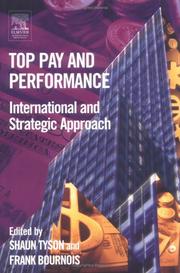| Listing 1 - 10 of 262 | << page >> |
Sort by
|
Book
ISBN: 9780080557380 0080557384 Year: 2008 Publisher: Bingley Emerald
Abstract | Keywords | Export | Availability | Bookmark
 Loading...
Loading...Choose an application
- Reference Manager
- EndNote
- RefWorks (Direct export to RefWorks)

ISBN: 1281004928 9786611004927 0080490425 9780080490427 6611004920 0120771268 9781281004925 Year: 2002 Publisher: San Diego Academic Press
Abstract | Keywords | Export | Availability | Bookmark
 Loading...
Loading...Choose an application
- Reference Manager
- EndNote
- RefWorks (Direct export to RefWorks)
General readers have no idea why people should care about what executives are paid and why they are paid the way they are. That's the reason that The Wall Street Journal, Fortune, Forbes, and other popular and practitioner publications have regular coverage on them. This book not only proposes a reason--executives need incentives in order to maximize firm value (economists call this ""agency theory"")--it also describes the nature and design of executive compensation practices. Those incentives can take the form of benefits (salary, stock options), perquisites (reflecting the status of
Executives --- Executive compensation --- Salaries, etc. --- Salaries, pensions, etc.

Abstract | Keywords | Export | Availability | Bookmark
 Loading...
Loading...Choose an application
- Reference Manager
- EndNote
- RefWorks (Direct export to RefWorks)
Book
ISBN: 0814452302 Year: 1970 Publisher: [New York] : American Management Association,
Abstract | Keywords | Export | Availability | Bookmark
 Loading...
Loading...Choose an application
- Reference Manager
- EndNote
- RefWorks (Direct export to RefWorks)
Executives --- Salaries, pensions, etc --- -Business executives --- Company officers --- Corporate officers --- Corporation executives --- Managers --- Management --- Salaries, etc --- -Salaries, etc --- Executive compensation --- Salaries, pensions, etc.

ISBN: 0566087332 9780566087332 1317057309 1315608340 9786611098254 1281098256 0754683109 Year: 2006 Publisher: Aldershot Gower
Abstract | Keywords | Export | Availability | Bookmark
 Loading...
Loading...Choose an application
- Reference Manager
- EndNote
- RefWorks (Direct export to RefWorks)
AA / International- internationaal --- 658.320 --- 650 --- Bezoldiging: algemeenheden. --- Theorieën en grondbeginselen. Management. --- Executives --- Salaries, etc. --- Executive compensation --- Salaries, etc --- Theorieën en grondbeginselen. Management --- Bezoldiging: algemeenheden --- Salaries, pensions, etc.
Book
ISBN: 1606498797 9781606498798 Year: 2015 Publisher: New York, New York (222 East 46th Street, New York, NY 10017) : Business Expert Press,
Abstract | Keywords | Export | Availability | Bookmark
 Loading...
Loading...Choose an application
- Reference Manager
- EndNote
- RefWorks (Direct export to RefWorks)
The chief executive officer (CEO) of a corporation and his or her executive team are responsible for the management of the business and its continued operating and financial success. The CEO and executive team are almost always highly compensated and the relative total compensation has mushroomed over time. Most of the compensation now is designed to be performance-based, but leading to charges that executives have incentives to manipulate corporate earnings and stock price in the short-term for their own self interests. The compensation at some companies became so egregious (Enron and other tech-bubble failures or Citigroup and other banks during the subprime meltdown) that compensation again became a major public policy issue subject to federal regulation. (Popular outrage and calls for government action against well-paid CEOs has been common at least since the 1930s.)
Executives --- Salaries, etc. --- agency theory --- compensation accounting --- economic theory --- executive compensation --- proxy statement and 10-k disclosure --- stock options/stock-based compensation
Book
Abstract | Keywords | Export | Availability | Bookmark
 Loading...
Loading...Choose an application
- Reference Manager
- EndNote
- RefWorks (Direct export to RefWorks)
Executives --- Profit-sharing --- Stock options --- Merit pay --- Golden parachutes (Executive compensation) --- Salaires --- Participation aux bénéfices --- Options d'achat d'actions --- Salaire au mérite --- Parachutes dorés --- Salaries, etc. --- Cadres (Personnel)
Book
Year: 2013 Publisher: Washington, D.C., The World Bank,
Abstract | Keywords | Export | Availability | Bookmark
 Loading...
Loading...Choose an application
- Reference Manager
- EndNote
- RefWorks (Direct export to RefWorks)
This paper examines how corporate governance and executive compensation affected bank capitalization strategies for an international sample of banks in 2003-2011. "Good" corporate governance, which favors shareholder interests, is found to give rise to lower bank capitalization. Boards of intermediate size, separation of the chief executive officer and chairman roles, and an absence of anti-takeover provisions, in particular, lead to low bank capitalization. However, executive options and stock wealth invested in the bank are associated with better capitalization except just before the crisis in 2006. In that year, stock options wealth was associated with lower capitalization, which suggests that potential gains from taking on more bank risk outweighed the prospect of additional loss. Banks' tendencies to continue payouts to shareholders after experiencing negative income shocks are shown to reflect executive risk-taking incentives.
Bank Capital --- Banks & Banking Reform --- Corporate Governance --- Corporate Law --- Debt Markets --- Dividend Payouts --- Economic Theory & Research --- Executive Compensation --- Finance and Financial Sector Development --- Investment and Investment Climate --- Private Sector Development
Book
ISBN: 9781509527793 1509527796 9781509527809 150952780X 9781509527830 1509527834 Year: 2018 Publisher: Cambridge, UK: Polity press,
Abstract | Keywords | Export | Availability | Bookmark
 Loading...
Loading...Choose an application
- Reference Manager
- EndNote
- RefWorks (Direct export to RefWorks)
Wages for the majority have been stagnant for decades, but a lucky few have enjoyed a pay bonanza. Top company bosses take home in several days as much as most people earn in a whole year. In the US, their salaries are over 347 times greater than the average pay packet. In this trenchant book, Deborah Hargreaves, director of the High Pay Centre, explains why pay for the top 0.1% has sky-rocketed in the past 20 years. She shows how it emerged as the result of a series of political decisions, and gives a devastating account of how it has created a vicious circle that destabilises our economy and undermines social cohesion. She goes on to demolish the twisted logic of the chief executives who say: 'I'm worth it, ' when 'worth it' means raking in 70m a year. A rigorous expos of the dysfunctional nature of our 'winner-takes-all' economy, this book debunks the myths behind top bosses' pay and examines a range of pragmatic policies for reversing runaway wage inequality.
Chief executive officers --- Executives --- Salaries, etc --- CEOs (Executives) --- Executive officers, Chief --- Executive compensation --- Salaries, pensions, etc. --- #SBIB:316.334.2A553 --- #SBIB:316.334.2A340 --- #SBIB:316.334.2A72 --- Personeelsbeleid en loonbeleid, functieclassificaties --- Arbeidssociologie: ongelijkheden op de arbeidsmarkt: algemeen --- Beroepensociologie: kaderpersoneel --- Wages --- Salaries, etc. --- E-books --- Chief executive officers - Salaries, etc. --- Executives - Salaries, etc.
Book
ISBN: 0191648582 129939731X 9780191648588 9781299397316 9780191749407 0191749400 9780199669806 0199669805 Year: 2013 Publisher: Oxford Oxford University Press
Abstract | Keywords | Export | Availability | Bookmark
 Loading...
Loading...Choose an application
- Reference Manager
- EndNote
- RefWorks (Direct export to RefWorks)
The compensation packages of a growing proportion of firms include pay schemes that are linked to employee or company performance, yet little is known about the patterns of performance related pay. This book compares US and European CEOs to investigate the evolution of executive compensation, its controversies, and its resulting regulations.
Executives --- Merit pay. --- Salaries, etc. --- Merit increases --- Merit pay programs --- Merit pay systems --- Merit-type salary schedules --- Pay for performance --- Salary schedules, Merit-type --- Variable pay --- Performance awards --- Wages --- Executive compensation --- Salaries, pensions, etc. --- Merit pay --- Executive ability --- Business executives --- Company officers --- Corporate officers --- Corporation executives --- Managers --- Management --- Administrative ability --- Executive skills --- Ability --- Salaries, etc --- E-books --- -Merit pay --- -Executives --- -Executive ability --- -Salaries, etc.
| Listing 1 - 10 of 262 | << page >> |
Sort by
|

 Search
Search Feedback
Feedback About UniCat
About UniCat  Help
Help News
News